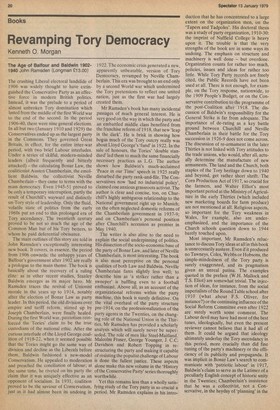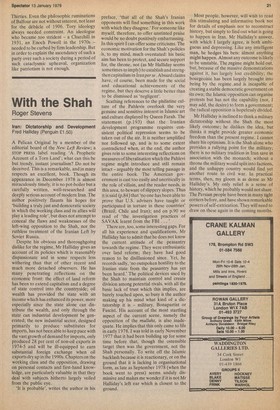Revamping Tory Democracy
Kenneth 0. Morgan
The Age of Balfour and Baldwin 19021940 John Ramsden (Longman £13.00) The crushing Liberal electoral landslide of 1906 was widely thought to have extinguished the Conservative Party as an effec tive force in modern British politics. Instead, it was the prelude to a period of almost unbroken Tory domination which lasted from the middle of the first World war to the end of the second. In the period 1906-40, there were nine general elections. In all but two (January 1910 and 1929) the Conservatives ended up as the largest party in the Commons. They governed Great Britain, in effect, for the entire inter-war period, with two brief Labour interludes. Under a series of skilful, modern-minded leaders (albeit frequently and bitterly attacked) — the calculating Bonar Law, the coalitionist Austen Chamberlain, the emollient Baldwin, the collectivist Neville Chamberlain — they came to terms with the mass democracy. Even 1945-51 proved to be only a temporary interruption, partly the result of Churchill's wayward and distinctly un-Tory style of leadership. Only the fluid, volatile state of politics from the early 1960s put an end to this prolonged era of Tory ascendancy. The twentieth century proved to be not so much the age of the Common Man but of his Tory betters, to whom he paid deferential obeisance.
The main outlines of this story are told in John Ramsden's exceptionally interesting new book. It covers, in essence, the period from 1906 onwards: the unhappy years of Balfour's government after 1902 are really a prologue to the main theme. The book is basically about the recovery of a ruling elite: as in other recent studies, Stanley Baldwin emerges as its major hero. Mr Ramsden traces the revival of Unionist morale in the years up to 1914, notably after the election of Bonar Law as party leader. In this period, the old divisions over empire and tariff reform, stirred up by Joseph Chamberlain, were finally healed. During the first World war, patriotism reinforced the Tories' claim to be the true custodians of the national ethic. After the curious interlude of the Lloyd George coalition of 1918-22, when it seemed possible that the Tories might go the same way of division and decline as the Liberals before them, Baldwin fashioned a new-model Conservatism. He appealed to moderation and preached the conciliation of labour; at the same tirde, he riveted on his party the claim that it was uniquely effective as an opponent of socialism. In 1931, coalition proved to be the saviour of Conservatism, just as it had almost been its undoing in 1922. The economic crisis generated a new, apparently unbeatable, version of Tory Democracy, revamped by Neville Chamberlain. This era was brought to an end only by a second World war which undermined the Tory pretensions to reflect one united nation, just as the first war had largely created them.
Mr Ramsden's book has many incidental passages of much general interest. He is very good on the way in which the party and an embattled middle class benefited from the franchise reform of 1918, that new 'leap in the dark'. He is brisk in showing how bogus much of the Tory outcry really was about Lloyd George's 'fund' in 1922. In the sale of honours, the Tories' double standard' led them to much the same financially necessary practices as L.G. The author shows how Baldwin's much-acclaimed 'Peace in our Time' speech in 1925 really disturbed the party rank-and-file. The Conservatives now 'had no industrial policy', claimed one anxious grassroots activist. The author is clear and concise, too, on Churchill's highly ambiguous relationship to the National government right up to Munich; on the often neglected domestic reforms of the Chamberlain government in 1937-9; and on Chamberlain's personal position after Churchill's accession as premier in May 1940.
The writer is also alive to the need to explain the social underpinning of politics. His dissection of the socio-economic base of the party of Bonar Law, and later of Neville Chamberlain, is most interesting. The book is also most perceptive on the personal qualities of both Law and Baldwin. Neville Chamberlain fares slightly less well; to describe him as 'a striker rather than a sweeper' is baffling even to a football enthusiast. Above all, as an account of the organizational reforms within the party machine, this book is surely definitive. On the vital overhaul of the party structure pre-1914, on the professionalization of the party agents in the Twenties, on the changing role of the National Union in the Thirties, Mr Ramsden has provided a scholarly analysis which will surely never be superseded. The role of men like Steel-Maitland, Malcolm Fraser, George Younger, J. C.C. Davidson and Robert Topping in restructuring the party and making it capable of resisting the populist challenge of Labour is done the fullest justice. These aspects alone make this new volume in the 'History of the Conservative Party' series thoroughly worthwhile.
Yet this remains less than a wholly satisfying study of the Tory party in so crucial a period. Mr Ramsden explains in his intro duction that he has concentrated to a large extent on the organization men, on the 'Tapers and Tadpoles'. His doctoral thesis was a study of party organization, 1910-30: the imprint of Nuffield College is heavy upon it. The trouble is that the very strengths of the book are in some ways its undoing. The emphasis on structure and machinery is well done — but overdone. Organization counts for rather too much, policies, issues and ideas for rather too little. While Tory Party records are freely cited, the Public Records have not been used at all. There is not enough, for example, on the Tory response, nationwide, to the 1909 People's Budget, or on the Conservative contribution to the programme of the post-Coalition after 1918. The discussion of Baldwin's responsibility for the General Strike is far from adequate. The importance of de-rating as a key battle ground between Churchill and Neville Chamberlain in their battle for the Tory succession in 1926-9 does not come across. The discussion of re-armament in the later Thirties is not linked with Tory attitudes to the trade unions, who would, after all, actually determine the manufacture of new armaments. The land and the Church, both staples of the Tory heritage down to 1940 and beyond, get rather short shrift. The Corn Production Act of 1917, so crucial for the farmers, and Walter Elliot's most important period at the Ministry of Agriculture in the early Thirties (which included new marketing boards for farm produce) are not mentioned at all. Religious aspects, so important for the Tory weakness in Wales, for example, also are underemphasized, and the importance of the Church schools question down to 1944 barely touched upon.
Most important, Mr Ramsden's reluctance to discuss Tory ideas at all in this book is unnecessarily austere. Even if it produced no Tawneys, Coles, Webbs or Hobsons, the simple-mindedness of the Tory party is surely exaggerated, and its pragmatism given an unreal patina. The examples quoted in the preface (W.H. Mallock and T.S. Eliot) are somewhat trivial. The injection of ideas, for instance, from the social imperialists of the Round Table school after 1910 (what about F.S. Oliver, for instance?) or the continuing influence of the Social Reform Committee even after 1922 are surely worth some comment. The Labour devil may have had most of the best tunes, ideologically, but even the present reviewer cannot believe that it had all of them. It could be argued that ideology ultimately underlay the Tory ascendancy in this period, more crucially than did fine tuning of the party's machinery or the efficiency of its publicity and propaganda. It was implicit in Bonar Law's search to communicate with 'patriotic labour' in 1917, Baldwin's claim to serve as the Latimer of a peculiarly English concept of historic unity in the Twenties; Chamberlain's insistence that he was a collectivist, not a Conservative, in the heyday of 'planning' in the Thirties. Even the philosophic ruminations of Balfour are not without interest, not least for the debacle of 1906. Tory ideology always needed constraint. An ideologue who became too strident a Churchill in 1931, an Enoch Powell in the 1970s needed to be curbed by firm leadership. But in order to explain the ascendancy of such a party over such a society during a period of such cataclysmic upheaval, organization like patriotism is not enough.



































 Previous page
Previous page